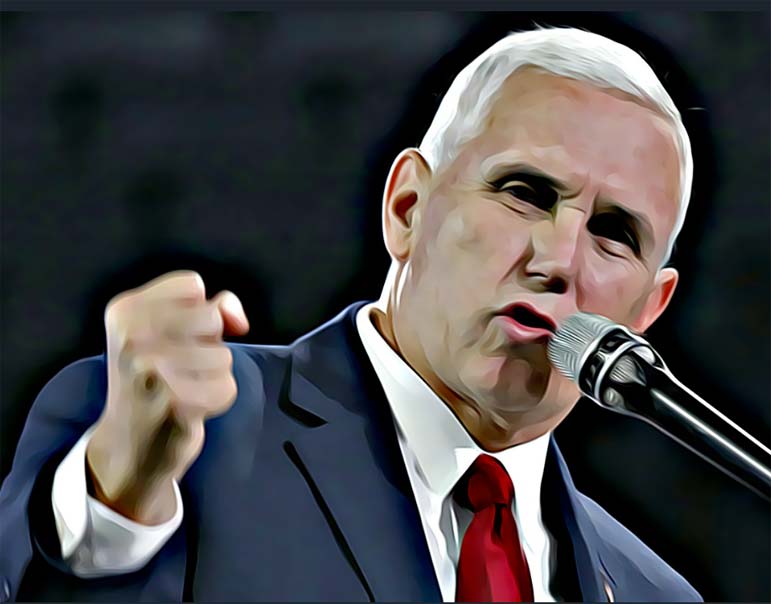
TALLINN, Estonia - Vice President Mike Pence, on his first full day in Eastern Europe, twice offered a clear and direct message to Russia, warning the Kremlin that the United States will not tolerate Russian force or intimidation toward its neighbors and reassuring the Baltic States that the U.S. supports them in the face of "the specter of aggression from your unpredictable neighbor to the east."
"Under President Donald Trump, the United States of America rejects any attempt to use force, threats, intimidation, or malign influence in the Baltic states or against any of our treaty allies," Pence said Monday morning, speaking alongside three Baltic leaders at the Estonian president's office here. "To be clear, we hope for better days, for better relations with Russia, but recent diplomatic action taken by Moscow will not deter the commitment of the United States of America to our security, the security of our allies, and the security of freedom loving nations around the world."
Pence's comments came in response to President Vladimir Putin's announcement Sunday that U.S. diplomatic missions in Russia will have to reduce their staffs by 755 people - a retaliatory measure to the Russia sanctions legislation Trump plans to sign this week.
The vice president's remarks, at a joint news conference with the presidents of Estonia, Latvia and Lithuania, offered a preview of the roughly 20-minute speech Pence delivered just hours later outside the headquarters of the Estonian Defense Forces, in which he again offered a stern rebuke of Russia's recent actions to undermine democratic nations, including the U.S.
The tableau of Pence and the three Baltic leaders also underscores one of the themes of his three-and-a-half-day trip to Estonia, Georgia and Montenegro: That the United States is standing - literally - with its Eastern European allies now feeling increased pressure from Russia.
Touting Trump's decision, in the face of mounting bipartisan political pressure, to sign the sanctions legislation, Pence criticized Russia for seeking "to redraw international borders by force, undermine the democracies of sovereign nations, and divide the free nations of Europe."
Though Pence said he was delivering a message directly from Trump, his stern remarks at times were far more forceful than those of his boss, who has often opted for a softer tone on Russia, including repeatedly refusing to definitively accept the conclusion of his intelligence community that Russia meddled in the 2016 elections.
The vice president also - and perhaps optimistically, in the face of Russia's retaliatory gesture - held out the prospect of what he called "a constructive relationship with Russia, based on cooperation on common interests."
"President Trump has made it clear: America is open to a better relationship," Pence said. "But the president and our Congress are unified in our message to Russia - a better relationship, and the lifting of sanctions, will require Russia to reverse the actions that caused the sanctions to be imposed in the first place."
Despite Trump's repeated assertions on the campaign trail, and then again in the White House, that he would like to have improved relations with Putin, the prospect currently seems unlikely. Though the two men met on the sidelines of the Group of 20 summit in early July - and had a second, undisclosed and more informal meeting at a group dinner later than evening - Putin told the Rossiya-1 television channel in an interview Sunday that he planned to cap the number of American diplomatic and technical personnel in Russia at 455.
Putin also signaled Russia's plans to seize two U.S. diplomatic properties - a dacha in Moscow and a warehouse - in a response that mirrors the U.S. decision to revoke access to two of Russia's diplomatic compounds, in the wake of Russia's meddling in the 2016 presidential election.
In his speech, the vice president not only promised solidarity against Russian aggression, but also reaffirmed the U.S.'s commitment to the shared defense cornerstone of the North Atlantic Treaty Organization.
"And be assured: The United States rejects any attempt to use force, threats, intimidation, or malign influence in the Baltic States or against any of our treaty allies," Pence said. "And under President Donald Trump, the United States of America will stand firmly behind our Article 5 pledge of mutual defense."
Estonia is one of only five countries that currently meets its Article 5 commitment to spend two percent of its gross domestic product on defense, a fact Pence mentioned several times. But, the vice president noted with enthusiasm, Latvia and Lithuania are both on track to meet their defense spending goals by the end of 2018.


 Contact The Editor
Contact The Editor
 Articles By This Author
Articles By This Author